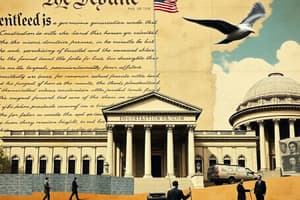Podcast
Questions and Answers
What is a federal system?
What is a federal system?
A federal system is a shared or divided power by national and state governments.
Where are expressed powers listed and what is an example of it?
Where are expressed powers listed and what is an example of it?
Expressed powers are listed in the constitution and an example is the power to coin money.
What are implied powers based on and what progress does it bring?
What are implied powers based on and what progress does it bring?
Implied powers are based on statements of the constitution, such as the president being the commander-in-chief of the armed forces, which implies that the president has the power to send troops to respond to a crisis.
What are three concurrent powers?
What are three concurrent powers?
In the 10th amendment, what are the reserved powers of state governments?
In the 10th amendment, what are the reserved powers of state governments?
How does the supremacy clause limit state power?
How does the supremacy clause limit state power?
What are the concurrent powers of the national and state governments?
What are the concurrent powers of the national and state governments?
Why were both federal and state governments given the power to collect taxes?
Why were both federal and state governments given the power to collect taxes?
By being denied to states, what does the national government have?
By being denied to states, what does the national government have?
What are concurrent powers?
What are concurrent powers?
What are inherent powers?
What are inherent powers?
What are reserved powers?
What are reserved powers?
When writing the constitution, what did the Framers create to establish a stronger government?
When writing the constitution, what did the Framers create to establish a stronger government?
What is an example of state constitutions being very long and specific?
What is an example of state constitutions being very long and specific?
How are grants-in-aid used and what is an example of it?
How are grants-in-aid used and what is an example of it?
Where do reserved powers come from?
Where do reserved powers come from?
What is the list of rights guaranteed to each citizen in Florida?
What is the list of rights guaranteed to each citizen in Florida?
What is federalism?
What is federalism?
What are denied powers?
What are denied powers?
What are implied powers?
What are implied powers?
What are grants-in-aid?
What are grants-in-aid?
What is the supremacy clause?
What is the supremacy clause?
Flashcards are hidden until you start studying
Study Notes
Federal System
- A federal system divides power between national and state governments.
Expressed Powers
- Expressed powers are explicitly listed in the Constitution.
- Example: The power to coin money.
Implied Powers
- Implied powers derive from the Constitution's statements.
- Example: The president's power as commander-in-chief implies authority to send troops.
Concurrent Powers
- Concurrent powers are held by both national and state governments.
- Examples include the power to tax, borrow money, and enact laws.
Reserved Powers (10th Amendment)
- Reserved powers are specific to state governments as per the 10th Amendment.
- They include regulating trade between states, conducting elections, and safeguarding public health.
Supremacy Clause
- The supremacy clause places the Constitution and federal laws above state laws.
- This limits state powers in case of conflict with federal legislation.
Role of Taxation
- Both federal and state governments can collect taxes due to their concurrent powers.
Powers Denied to States
- National government powers include regulating trade, coining money, and conducting foreign relations.
Description of Concurrent Powers
- Concurrent powers encompass those shared by national and state governments, such as court systems and law enforcement.
Inherent Powers
- Inherent powers are those necessary for a government to function, not explicitly listed in the Constitution.
Reserved Powers
- Reserved powers are those retained for the states, often broad and significant in scope.
Creation of a Federal System
- The Framers designed a federal system to strengthen government functionality.
Length of State Constitutions
- State constitutions, like Florida’s, can be very lengthy and detailed, with Florida's constitution totaling approximately 57,000 words.
Grants-in-aid
- Grants-in-aid from the federal government aim to meet congressional goals, often funding health care or education.
Source of Reserved Powers
- Reserved powers originate from the 10th Amendment.
Rights in Florida
- The Declaration of Rights guarantees specific rights to each citizen in Florida.
Definition of Federalism
- Federalism refers to the division of power between a central government and smaller regional governments.
Denied Powers
- Denied powers refer to actions and rights that are prohibited from being exercised by individuals.
Further Explanation of Implied Powers
- Implied powers are not clearly stated in the Constitution but are understood to exist.
Nature of Grants-in-aid
- Grants-in-aid represent significant federal funds provided to states, highlighting collaboration between state and federal governments.
Supremacy Clause Explained
- The supremacy clause in Article IV of the Constitution establishes that federal laws take precedence over conflicting state laws.
Studying That Suits You
Use AI to generate personalized quizzes and flashcards to suit your learning preferences.




